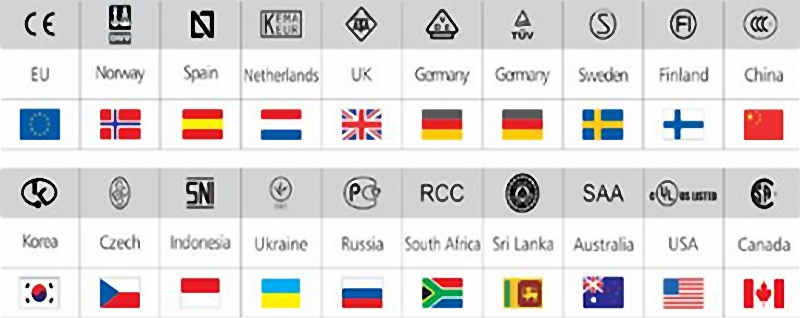Top 10 International LED lights Standards
13-01-2015
Energy efficiency is becoming more and important in an energy-saving world. LEDs are being recognized as the next generation green lights for its advantages in energy efficiency, environmental friendliness and long lifetimes. Countries are increasingly focused on the LED lights industry, with many countries launching related regulations or standards.
3C certification
The 3C standard is a mandatory product certification system in China to protect consumer rights and safety. The products need product quality management and a legal product evaluation system.
The 3C standards aim to bring a unified product index, standard, technology regulations, evaluation protocol, standard label, and cost system to the Chinese market. This will provide a solution to China versatile product certification systems, where there are overlapping government agencies in charge of product reviews, and unnecessary product certification fees. A universal certification system can normalize the product certification process, and helps free trade.
ISO9000 certification
Certification organizations for the international ISO9000 are legal institutes recognized by global governments. The ISO9000 product quality certification process is very strict. Acquiring this specific standard certification can make products legal, scientific, and greatly raise work efficiency and product qualify. Once factories receive the high standard ISO9000 certification, factories can win more trust from clients. Clients will be more willing to sign sales orders, and expand company market share.
UL certification
Underwriters Laboratories (UL) is a U.S. safety consulting and certification company. The company is the most influential test lab in the U.S., and is one of the world largest civilian independent product safety test labs. The company specializes in public safety tests, and uses scientific methods to ensure product materials, devices, products, equipment, and buildings do not hurt human life or property. The lab issues relevant standards and information to prevent the loss of human life or property. The lab also launches relevant investigations.
FCC certification
The Federal Communications Commission (FCC) was established in 1934 by an independent U.S. organization, and directly reports to congress. FCC uses wireless broadcast, TV, telecommunication, satellite and cable to communicate in U.S. and internationally. Many wireless applications, telecommunications and digital products must receive FCC certification before entering the U.S. market. The FCC will also test and study product safety at various stages to find the best solutions. Wireless electronics and navigation device testing are also services provided by the FCC.
CE Recognition
CE standards are safety standards to ensure products do not hurt human life, animals and meet essential safety requirements. The regulations are different from average product quality standards, and CE standards usually require the products to meet a certain standard.
The safety standard is viewed as a passport for factories to enter the European market. European regulations make the CE standard a mandatory requirement for imported products to be sold on the market.
MET standard
The MET standard is applicable in the U.S. and Canadian markets. Products labelled with the C-US and MET mark have passed certifications and can be sold on both markets.
CB standard
The CB system is a testing certification system under IEC. The IECEE is an international standard system based on IEC standards to test electronic product safety. The test results are published in the CB test reports and certification. Each member state can acquire recognition under the IECEE, which aims to reduce international trade barriers caused by different country standards.
CSA certification
Canadian Standards Association (CSA) was established in 1919, and is the first standard Non-Profitable Organization (NPO) in Canada. Electronic products sold in North America need to pass product safety certification. The CSA is currently the largest safety standard organization in Canada, it is also one of the most world-famous safety organization. The CSA certifies the safety of machines, building material, electronics, computer, office equipment, environmental, medical, fire safety, sports, and entertainment products.
GS Standards
The Geprüfte Sicherheit (The GS mark) is a German safety standard. GS certified products are based on the German Equipment and Product Safety Act, and follows the EU unified EN standard or Germany DIN standard. The standard is voluntary and recognized in Europe and Germany.
VDE recognition
Located in Offenbach, Germany, the Verband der Elektrotechnik (VDE) is also the Association for Electrical, Electronic and Information Technologies. The VDE was first founded in 1920 as a neutral and independent product testing certification facility. The VDE test laboratories cover testing and certification for VDE standards, Europe EN standards, or IEC standards and certification. In many countries, VDE standard labels are more well-known than local country standards, and are especially valued by importing or exporting companies.


